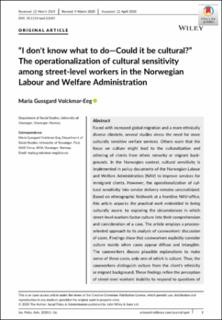“I don't know what to do—Could it be cultural?” The operationalization of cultural sensitivity among street‐level workers in the Norwegian Labour and Welfare Administration
Peer reviewed, Journal article
Published version

View/
Date
2020Metadata
Show full item recordCollections
Original version
Volckmar‐Eeg, M. G. (2021). “I don't know what to do—Could it be cultural?” The operationalization of cultural sensitivity among street‐level workers in the Norwegian Labour and Welfare Administration. Social Policy & Administration, 55(1), 97-112. 10.1111/spol.12615Abstract
Faced with increased global migration and a more ethnically diverse clientele, several studies stress the need for more culturally sensitive welfare services. Others warn that the focus on culture might lead to the culturalization and othering of clients from ethnic minority or migrant backgrounds. In the Norwegian context, cultural sensitivity is implemented in policy documents of the Norwegian Labour and Welfare Administration (NAV) to improve services for immigrant clients. However, the operationalization of cultural sensitivity into service delivery remains unscrutinized. Based on ethnographic fieldwork at a frontline NAV-office, this article unpacks the practical work embedded in being culturally aware, by exploring the circumstances in which street-level workers factor culture into their comprehension and consideration of a case. The article employs a process-oriented approach to its analysis of caseworkers' discussion of cases. Findings show that caseworkers explicitly consider culture mainly when cases appear diffuse and intangible. The caseworkers discuss plausible explanations to make sense of these cases, only one of which is culture. Thus, the caseworkers distinguish culture from the client's ethnicity or migrant background. These findings refine the perception of street-level workers' inability to respond to questions of ethnicity and culture, by describing the dynamic processes of implicit categorization and sensemaking embedded in being aware of culture. The study also highlights the importance of empirical, ethnographic accounts to unpack the operationalization of such theoretical and ambiguous concepts into practice.
